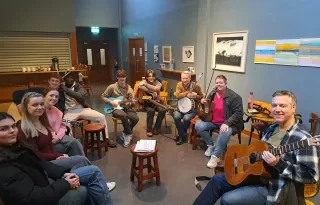Maynooth University and Dundalk Institute of Technology officially launch MU-DkIT Regional Graduate Academy
Maynooth University (MU) and Dundalk Institute of Technology (DkIT) have today officially launched the MU-DkIT Regional Graduate Academy. The Regional Graduate Academy (RGA) will offer structured PhD programmes supervised by DkIT staff, with doctoral students jointly registered at both institutions and receiving their degree from Maynooth University. PhD programmes are currently approved in six disciplinary areas; Computer Science, Biology, Environmental Science, Electronic Engineering (Renewables), Applied Social Sciences and Media Studies.
This event, celebrates the first major milestone in the strategic collaboration between Dundalk Institute of Technology (DkIT) and Maynooth University (MU), following their Letter of Intent signed in June 2024.
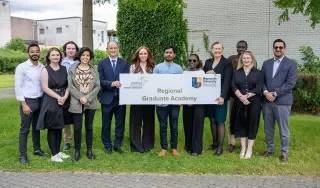
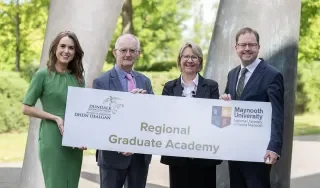
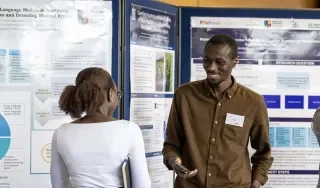
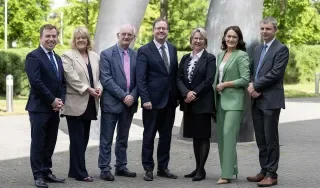
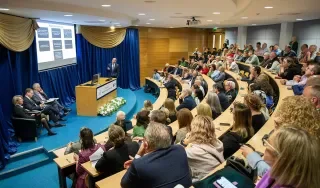
This strategic engagement between MU and DkIT is a collaborative effort to enhance higher education in the region to explore new ways to collaborate, focusing on innovative research and academic initiatives that benefit our students, our staff and the wider community. Supported by the Higher Education Authority (HEA) Technological Sector Advancement Fund (TSAF), DkIT and MU are actively exploring and developing the nature, scope and scale of a strategic engagement between the two institutions.
Speaking at the launch event, Minister for Further and Higher Education, Research, Innovation and Science, James Lawless T.D. said:
“A clear example of regional ambition in action, it is an honour to launch the Maynooth University and Dundalk Institute of Technology Regional Graduate Academy. Delivering on DkIT’s strategic goal to continue provision of Level 10 education in the region, the Academy marks a new and significant phase of collaboration between two strong institutions.
This partnership is to be commended. It reflects a shared commitment to building research capacity, strengthening ties with enterprise, and supporting the development of local communities, while enhancing the national research and innovation ecosystem.
I welcome that this initiative has been supported by my Department through the HEA and the Technological Sector Advancement Fund. It demonstrates what can be achieved when we invest in talent, partnership, and regional development.”
Dr Alan Wall, CEO of the Higher Education Authority welcomed the launch of the MU-DkIT Regional Graduate Academy:
“The HEA is committed to supporting the strategic development of higher education institutions in the context of their individual missions and strategic plans, and provision was made in the Technological Sector Advancement Fund (TSAF) for institutions to explore strategic collaborations that are aligned with national and regional policies and priorities. It very encouraging to see the progress made by DkIT and Maynooth University on the Regional Graduate Academy, and this initiative is an important milestone in the strategic engagement of these higher education institutions.
“The MU-DkIT Regional Graduate Academy is a tangible example of how collaboration can enhance Ireland’s higher education and research system locally, regionally, nationally, and internationally. The structured programmes that will be available in Computer Science, Biology, Environmental Science, Electronic Engineering (Renewables), Applied Social Sciences, and Media Studies will advance research and innovation in these disciplines and benefit students as well as the region.”
In addition to the establishment of the MU-DkIT Regional Graduate Academy, DkIT and MU are further developing collaborations in areas of mutual strategic benefit including Research and Innovation and Student Experience collaborative initiatives. Scoping out of the potential provision of MU awards to DkIT Level 8 and 9 programmes is also being carried out.
The first 16 postgraduate students in the MU-DkIT Regional Graduate Academy are engaged in a range of exciting projects, many of which many involve close collaboration with Industry partners. At the launch today, PhD students, Stephanie Woods, Shubhendu Madhavrao and Provia Kadusabe spoke about their research in the areas of environmental education for empowerment, the role of LINGO proteins and BK channels in tremor, and the application of Natural Language Processing (NLP) for analysing clinical notes and detecting medical errors.
Presenting her research, Stephanie Woods a PhD student in the MU-DkIT Regional Graduate Academy said:
"I began my journey at DkIT as a research assistant on the H2O Heroes environmental education programme, led by Dr. Caroline Gilleran Stephens and Dr. Suzanne Linnane at the Centre for Freshwater and Environmental Studies (CFES). The centre was a vibrant research environment that exposed me to a range of perspectives. Through my work on H2O Heroes, I witnessed first-hand the positive impact environmental education was having on young people in Ireland. This experience inspired me to pursue my own research into environmental education and its potential to alleviate eco-anxiety among Irish youth. I am delighted to be part of the first cohort of the MU-DkIT Regional Graduate Academy to complete my PhD project, which bridges CFES and the Department of Nursing, Midwifery and Early Years at DkIT. Supported by my supervisors Dr. Suzanne Linnane, Dr. Aine McHugh, and Dr. Caroline Gilleran Stephens, our goal is to empower young people to take meaningful action in response to the climate crisis."
A Regional impact assessment of the effects of the strategic engagement of MU and DkIT on the shared region is currently ongoing. One of the overarching priorities of this strategic collaboration is to ensure high quality and well recognised higher education and research in the region, providing opportunities for local students, to retain graduate talent in the region, and thus supporting the local economy and community.
Welcoming the announcement, Professor Eeva Leinonen, President of Maynooth University (MU), said:
“The MU–DkIT Regional Graduate Academy represents a new kind of partnership — one that moves beyond institutional boundaries to create something greater than the sum of its parts. DkIT is a natural partner for Maynooth University, with complementary strengths and a shared commitment to regional impact and research excellence. Together, we are building a collaborative model of doctoral education that is rooted in place, shaped by purpose, and driven by ambition — delivering real benefits for our students, our communities, and the broader research ecosystem.”
Dr Diarmuid O’Callaghan, President of Dundalk Institute of Technology (DkIT) added:
“We are delighted to welcome our colleagues from Maynooth University to DkIT to officially launch the MU-DkIT Regional Graduate Academy. Our first cohort of students are already making their marks on the research landscape. This collaboration is a wonderful opportunity for each institution to showcase its individual strengths and explore together how we can strategically develop to serve our regions. Through our shared values, unique offerings and collective commitment to regional partnership and collaboration I have high aspirations for the future opportunities it will bring for our students, enterprise and everyone in the shared region.”
Note for Editors:
About Maynooth University
One of four constituent universities of the National University of Ireland, Maynooth University in 2024 ranked in the top 90 global Times Higher Education (THE) Young University rankings, placing 86th in the world. Tracing its origins to the foundation of the Royal College of St Patrick in 1795, Maynooth University was formally established as an autonomous university in 1997. Maynooth is one of Ireland’s fastest growing universities with more than 15,000 students, including almost 1,800 taught postgraduates and 530 research postgraduates.
About Dundalk Institute of Technology
Dundalk Institute of Technology (DkIT) has been at the forefront of delivering excellence in Higher Education to meet the educational, economic, social, and cultural needs of the North-East region since 1970. Set in an 87-acre campus, DkIT provides quality learning and teaching to circa 6,000 full-time and part-time students across four Schools in Business and Humanities, Health and Science, Engineering, and Informatics & Creative Arts. DkIT provides Undergraduate and Postgraduate degrees from Level 6 to Level 10 and has a track record of excellence in craft apprenticeship
